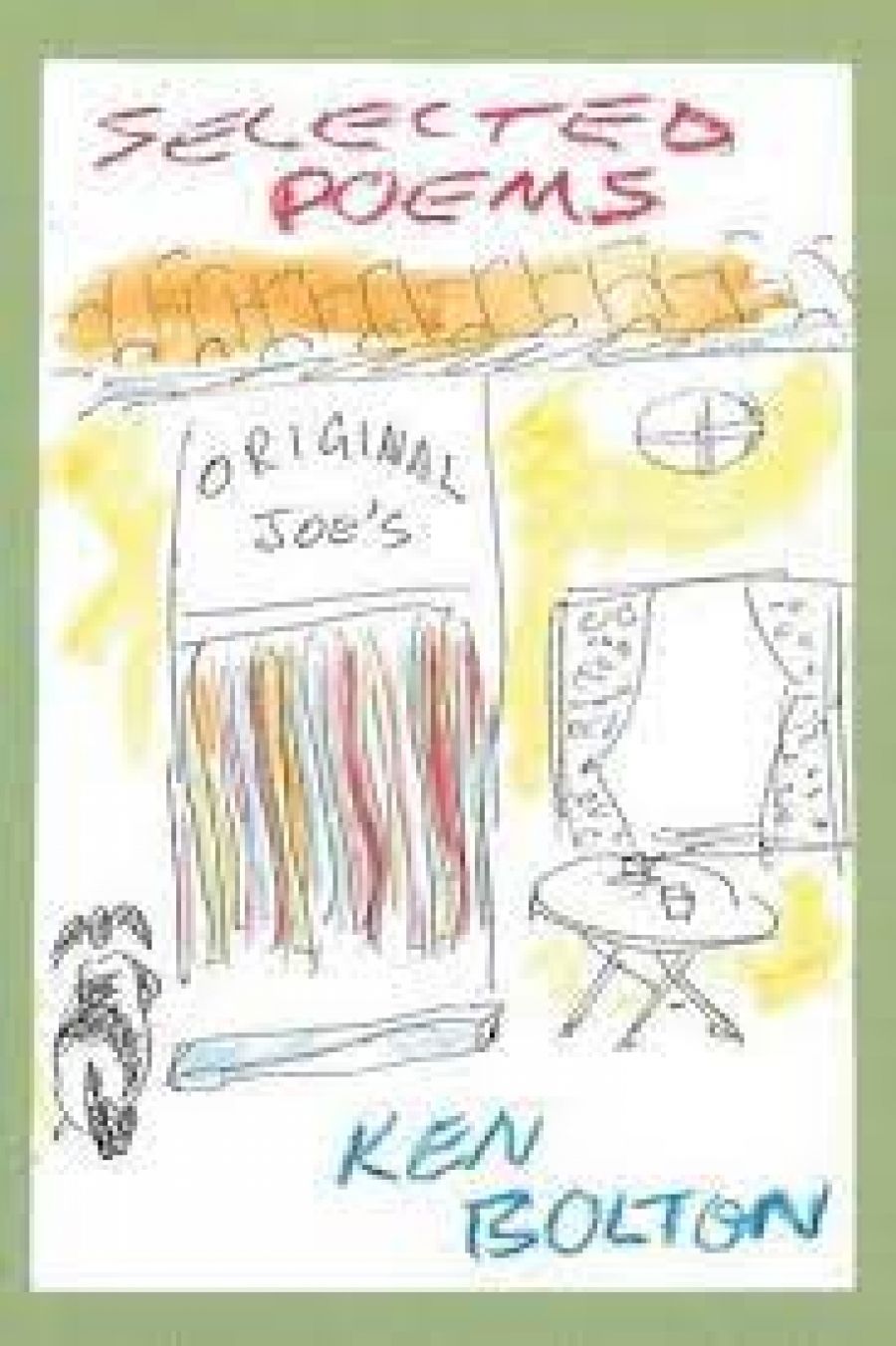
- Free Article: No
- Contents Category: Poetry
- Review Article: Yes
- Online Only: No
- Custom Highlight Text:
Ken Bolton has published twenty books of poetry in the past thirty-five years, including a verse novel, The Circus (2010), and an earlier Selected Poems (1992), as well as seven often hilarious poetic collaborations with John Jenkins. An art critic, Bolton edited the seminal magazines Magic Sam and Otis Rush; and he has been a publisher with Sea Cruise and Little Esther Books. Bolton’s poems amusingly undermine any sense of affected certainty or closure – ‘with none of the confidence / of Samuel Johnson, // with none of the élan of Frank O’Hara, / with only a guilty and apprehensive grin // because in part / I belong to the school that says // if you see a leg pull it // I begin this tour of my attitudes ...’ (‘Lecture: Untimely Meditations (Tentative Title)’). Rather, his work is buoyed by indeterminacy, in which a blithe surface both collapses and embodies intellectual enquiry, most apparent in his spacious, extended poems, but also in more descriptive ones, such as ‘Kirkman Guide to the Bars of Europe’, from Sly Mongoose (2011), and one not included here, ‘Happy Accidents’, which unravels his influences. ‘Perhaps my oeuvre in / large part represents / a slur on the poetry of my betters – / whose example / allows me to go wandering off, / by the reeds, ankle deep / in mud, / mumbling inconsequently – / somehow ‘licensed’ by them, / by their example – / though heedless of it?’ (‘Poem (Up Late)’).
- Book 1 Title: Selected Poems 1975–2010
- Book 1 Biblio: Shearsman Books, $25 pb, 209 pp, 9781848612099
- Book 2 Title: Four Poems
- Book 2 Biblio: Little Esther Books, $9 pb, 55 pp, 9780975222414
- Book 2 Cover Small (400 x 600):

- Book 2 Cover (800 x 1200):

- Book 2 Cover Path (no longer required): images/1_SocialMedia/2021/Dec_2021/META/KB4Po copy.jpg
From his first books, Four Poems (1977) and Blonde and French (1978), in which poems of process enact their construction with repeated phrases that enhance absurdity, to precariously poised treatise-like poems that mill around art, jazz, and R’n’B, his work piles into collage and discursiveness: ‘Where, the open neck shirted men, women in / thongs & sandals, ask is our shimmering ideal?’ (‘Horizon’). A conversational sheen drifts over a learned argumentativeness, as in his comical summary of ‘another faction’, who shout:
‘WE’RE for feeling!’
& ‘The brain’s a bad guy!’
(‘Lecture: Untimely Meditations (Tentative Title)’)
In ‘An Australian Suburban Garden’, a parodic exploration of the nature genre, Italian and British poets are contrasted: ‘British poets, it seemed to me, / rarely addressed anybody / but spoke as if they weren’t being heard, // as if it were impolite / to break any reigning silence – / especially in view of their having / ‘nothing to say’. // Me, I am given to the utterance in full voice. // (‘Ha ha’)’. As Bolton wrote in his doctoral exegesis/poem, his poems are in constant tension, ‘an impossible coalition – / say, the Labor Caucus’. Early poems glitter with surreal imagination, as when he depicts his contemporaries all driving Citroëns, with John Tranter in a Porsche. These poems deify characters simply by naming, and legitimise an aesthetic of fun and impulse.
Bolton also edited Homage to John Forbes (2002), and Forbes is often referenced, along with many associated with, or influenced by, the New York School – O’Hara, Ted Berrigan, James Schuyler, Michael Brownstein, Peter Schjeldahl, Tony Towle, Laurie Duggan – indicating how poetry is always partly an address to other poets: ‘I never wanted to be postcolonial / or colonial just modern which is / the joke on me – but who wants to be a category?’ (‘Horizon’). Another collaborative book, Let’s Get Lost (2005), is an exchange of poems between Bolton, Pam Brown, and Duggan, but Bolton is perhaps more consistently preoccupied with elongating ideas and opinions: ‘another article by McKenzie Wark in the papers / to the tune basically of // ‘Tomorrow belongs / to my Department’ // It probably does, too. // Nothing belongs to me’ (‘Double Trouble’).
The new Selected Poems varies from peripatetic narrative to occasional formalism, as in the relaxed, often obliquely rhymed quintains of ‘Some photos for Gabe’ – imagining his partner’s son ‘trawling across London, like those // small motorized cameras NASA / lands – on the surface of Mars, the moon, / or Jupiter – & information zooms / down to us & we see the terrain as a // wind-up truck might’; as well as two sestinas, ‘Bunny Melody’ and ‘Timeless Moment (Little Cup Sestina)’. Bolton casually places erudition within the everyday; oscillating ideas appear more compelling than static profundities, parodied in canonical poets such as Frost: ‘Something there is / that does not love an early opener // and something there is that does not love / ELECTRICITY SUBSTATIONS // but I do!’ (‘Blazing Shoes’).
Although lacking fine recent poems such as ‘Triumvirate’ and ‘Late Night Reading’ (from A Whistled Bit of Bop, 2010), and ‘Art History’, and ‘Apollinaire’ (Sly Mongoose, 2010),this is an impressive selection from a prolific poet. Crowded with friends and artists, these sociable, symposium-like poems apprehend and disrupt in giddying meditations on poetry and the arts. One of Bolton’s best books, Untimely Meditations (1997), takes its title from Nietzsche. Happily included from that book, ‘August 6th’ alludes to Shelley in a Joycean exposition of one typically rambling thought-spattered day.


Comments powered by CComment